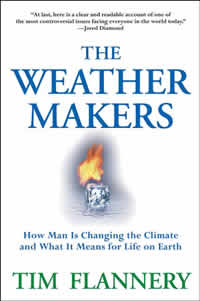Book Notes
 Tim Flannery, The Weather Makers; How Man is Changing the Climate and What It Means for Life on Earth (New York: Atlantic Monthly Press, 2005), 357pp.
Tim Flannery, The Weather Makers; How Man is Changing the Climate and What It Means for Life on Earth (New York: Atlantic Monthly Press, 2005), 357pp.
"Some time this century," writes the Australian scientist Tim Flannery, "the day will arrive when the human influence on the climate will overwhelm all natural factors." Our best scientific evidence, he argues, indicates that humans must reduce their CO2 emissions by 70% by 2050 in order to stabilize the current levels of atmospheric CO2 at double their pre-industrial stage (my emphasis). In that year 2050, our world population will stand at 9 billion people. By comparison, the signatories of the Kyoto Protocol committed themselves to reductions of 5.2%. The United States was one of only four countries not to sign the Kyoto agreement (the others were Australia, Monaco, and Liechtenstein).
For people like George W. Bush who say that they want "more certainty" about climate change, Flannery's thorough review of the history and science of global warming establishes the nature and dimensions of the problem beyond any reasonable doubt. Melting glaciers, species migration and extinction, and increased greenhouse gases are only a few of the barometers that measure the crisis. Of the thirty or so greenhouse gases in our atmosphere (many of which exist only in trace amounts), CO2 is by far the most abundant, and the cause of about 80% of all global warming. Burning the fossil fuels coal and oil, and to a lesser extent gas, releases the CO2 into our atmosphere, which then traps heat near the earth, warms the world, and alters the climate.
Flannery is passionate about his subject, but he never pretends that we have easy alternatives. He shows how and why controversies rage on due to the multidisciplinary nature of the subject that makes it complex, competing special interest groups, industry lobbies, corporate profits, and lack of political will. At the end of his book he places the responsibility squarely upon private citizens who, he believes, can take the fate of the earth into their own hands by making wise choices: "It's easy to condemn the extravagance that led to the situation in which we now find ourselves, but we must remember that until recently nobody had the slightest idea that their tailpipe emissions or their Hoover vacuum cleaner would have an impact on their children and grandchildren. The same cannot be said for us today, for the true cost of our four-wheel-drives, air conditioners, electric hot water service, clothes dryers, and refrigerators is increasingly evident to all. Moreover, in many developed nations we are three times as affluent on average as our parents were at the same stage of life, and therefore we are able to bear the cost of changing our ways."
Jared Diamond's book Collapse argued a simple and sobering fact of history, that even advanced civilizations vanished because of environmental distress. Al Gore's film and book, An Inconvenient Truth, and the blue-ribbon study Ecosystems and Human Well-Being: Synthesis. A Report of the Millennium Ecosystem Assessment (2005), are two other studies of the conclusive evidence. Flannery's book takes its place with them as one more clarion call to what might be the ultimate pro-life issue, the human degradation of planet earth.


